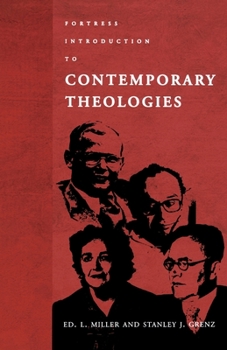Fortress Introduction to Contempory Theologies
Select Format
Select Condition 
Book Overview
A reader-friendly, basic introduction that maps the central ideas of the major theologians of the twentieth century, easily accessible to both the theological student and the inquiring lay reader.
Format:Paperback
Language:English
ISBN:0800629817
ISBN13:9780800629816
Release Date:August 1998
Publisher:Fortress Press
Length:256 Pages
Weight:0.70 lbs.
Dimensions:0.6" x 5.5" x 8.6"
Customer Reviews
3 ratings
The Modern Liberal Foundation
Published by Thriftbooks.com User , 18 years ago
Authors Miller and Grenz attempt to do that which is certainly daunting in the field of theological studies. They provide an overview of the various theologies which have shaped the religious landscape during the twentieth century. What makes this seem intimidating to many writers is the fact that the men whose theological minds are parlayed in the book are some of the more complex giants in the study of theology. The authors begin with an overview of Karl Barth, whom they consider "the greatest theologian of the twentieth century." This is followed by no less than the brothers Niebuhr, then Bultmann, Tillich, and Bonhoffer. One immediately gets the impression that real theology in the twentieth century was born of European stock, particularly German and Swiss. The early exception in this opening list is Tillich, and even he was German born. The point is not that there were no other theological views, nor that such perspectives are non-relational to the rest of the world, but that it was the European outlook which held sway in these formative years. There are of course other views presented in the book, such as the liberation theology of Gustavo Gutierrez, and the more personal application of such by Rosemary Ruether's theological feminism. Nevertheless, it will be insights from the likes of Barth, Bultmann, Tillich, Cobb, Pannenberg, and Hick which will probably make the book worthwhile to students of modern theology. Astute readers in the field of theology will note the glaring absence of any voices from the more conservative persuasion, which could be due in large part to the authors' own theological bent. Still, in the pursuit of fairness such a discussion could have been helpful and made the book a bit more balanced. Clearly an overview of the works by men like Henry, Packer, Berkhof, or Schaeffer would have been insightful, and the absence of such a discussion reveals one weakness in the book. Another weakness is perhaps one which cannot be helped, or is at least understandable. Some of the issues covered are quite complex (such as Bultmann's "Demythologizing Program" or Barth's theology of election), and often a general overview of such comes across as somewhat stilted and disconnected. The authors seem to assume at times that the reader has a working knowledge of the history and various applications of the historical-critical method which bear on the discussion at hand. If that is not the case, however, then it is doubtful that an adequate understanding will be achieved. Nevertheless, the authors do an admirable job in providing that which the book title promises - an introduction to some of the most influential theologians of our time, regardless of how one stands in respect to their presented viewpoints. This makes the book a worthwhile read, and students may very well come away with a deeper appreciation of their own theological tradition.
A Funny Thing Happened On The Way To The Editor
Published by Thriftbooks.com User , 19 years ago
On the back of Gary Dorrien's 1998 work THE REMAKING OF EVANGELICAL THEOLOGY, there is a supportive blurb from Stanley Grenz, who laments the fact that most works on "contemporary theology" ignore the contributions of evangelicals. Funny thing: in Grenz's book entitled CONTEMPORARY THEOLOGIES (also published in 1998), Grenz and co-author Ed Miller ignore . . . . evangelical theologians. Maybe Grenz and Miller thought they were covering evangelicalism with a discussion of Barth, but the interpretive issues surrounding Barth make this problematic. As far as acknowledged evangelicals go, there is a mention of Carl Henry in a footnote, a comparison between Tillich and Billy Graham (probably a first), and a couple of references to C.S. Lewis. That's about it. In spite of this apparent editorial oversight, this book is quite enjoyable. Grenz and Miller take various schools of contemporary theology and pick one or two theologians as exemplars. Existentialism is discussed in terms of Bultmann, neo-orthodoxy by Barth, feminism with Rosemary Ruether, etc. This is probably the best way to understand any given movement. A final problem with this book is that it doesn't contain a list of recommended readings. As an example, Barth's output was massive and a student would benefit from some suggestions.
Good
Published by Thriftbooks.com User , 25 years ago
I enjoyed this book. It provides an excellent run-down of the most influental theologies of the 20th Century. However, there is virtually no mention of conservative theologians.






